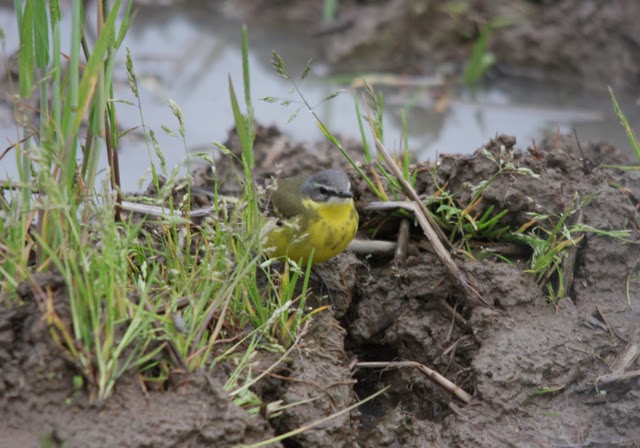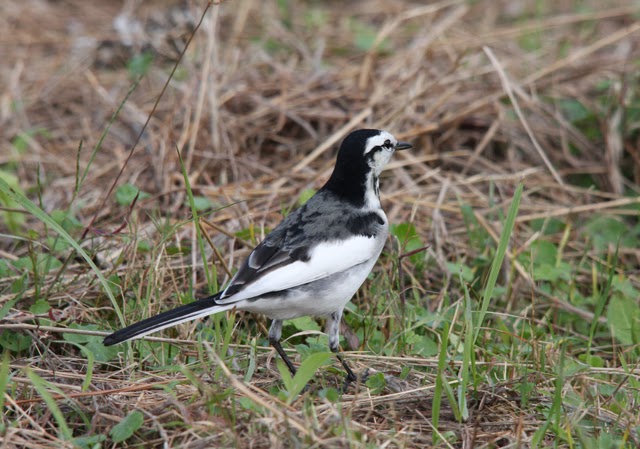 A disappearing Forest Wagtail at Miike (Kyushu), 4 January 2008. It was really tough trying to digiscope this bird dashing around among the trees. This is the best result I got!
A disappearing Forest Wagtail at Miike (Kyushu), 4 January 2008. It was really tough trying to digiscope this bird dashing around among the trees. This is the best result I got!Forest Wagtails have turned up and even over-wintered in Kansai, however they're rare anywhere in Japan. There has since been another wintering at the same spot as the bird I saw at Miike.
Eastern Yellow Wagtails are a fairly common migrant in southern and western Japan, particularly in spring on off-shore islands. I see many on Mishima and Tsushima when they don't present a serious identification problem but I usually visit Hegura in October where they are both uncommon at that time and far more challenging to identify. I've never seen one in Kansai and given their preference for open habitat and conspicuous appearance this says something about their status in this area.
I've never even heard of Citrine in Kansai but unfortunately missed one found by Gordon Hay (visiting from the UK) on Hegura last October (2013).
In Kyoto Grey Wagtail is quite common in winter and can be seen along the rivers or on various ponds. In summer they mostly retreat onto mountain rivers and are less obvious.
Japanese and White (lugens) wagtails are resident and the latter also a very common passage and winter visitor. Japanese seems to have a closer affinity to water and is the commoner of the two on rivers in the city. Large numbers of White Wagtails can gather on the fields at Ogura (and other arable areas, especially close to rivers) and pre-roost flocks of 50+ birds can be seen flying into many urban areas in the region. I've also seen ocularis (East Siberian Wagtail) in Kyoto but it's rare, whereas I see quite a few each spring on islands such as Mishima or Tsushima in western Japan. I haven't seen leucopsis in Kyoto but I have seen a very good contenders for leucopsis x leugens hybrids here.
In winter, even the casual visitor should see White, Japanese and Grey along the Kamo River in the centre of Kyoto.
An autumn Eastern Yellow on Hegura, 19 September 2006.
One of several tschutschensis on Tsushima, 30 April 2012.
 Another bird on the same date showing far more grey on the forehead as well as extensively on the nape, the supercillium has a distinct yellow tint.
Another bird on the same date showing far more grey on the forehead as well as extensively on the nape, the supercillium has a distinct yellow tint. An adult male with a yellowish face, this is meant to be a feature of first-winters as far as I'm aware. Katsura River (Kyoto), 3 October 2013.
An adult male with a yellowish face, this is meant to be a feature of first-winters as far as I'm aware. Katsura River (Kyoto), 3 October 2013.
Non-breeding adult lugens on the Katsura River (Kyoto), 30 December 2010.
First winter lugens on the Katsura River (Kyoto), 15 October 2010.
 M.a.ocularis (East Siberian Wagtail) on Mishima (Yamaguchi), May 2008. The conspicuously dark-centred coverts aren't typical and something of a puzzle.
M.a.ocularis (East Siberian Wagtail) on Mishima (Yamaguchi), May 2008. The conspicuously dark-centred coverts aren't typical and something of a puzzle.
A scruffy-looking moulting adult Japanese on the Katsura River (Kyoto), 18 September 2013.
Fresh adult Japanese on the Katsura River (Kyoto), 8 October 2012.





























No comments:
Post a Comment